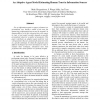121
Voted
DEXAW
2003
IEEE
15 years 8 months ago
2003
IEEE
Public-key infrastructures are a prerequisite for security in distributed systems and for reliable electronic commerce. It is their goal to provide the authenticity of public keys...
121
Voted
MSS
2005
IEEE
15 years 8 months ago
2005
IEEE
We present an architecture of a trust framework that can be utilized to intelligently tradeoff between security and performance in a SAN file system. The primary idea is to diffe...
101
Voted
IAT
2006
IEEE
15 years 8 months ago
2006
IEEE
We present a universal mechanism that can be combined with existing trust models to extend their capabilities towards efficient modelling of the situational (contextdependent) tr...
116
click to vote
ESORICS
2007
Springer
15 years 9 months ago
2007
Springer
Current trust models enable decision support at an implicit level by means of thresholds or constraint satisfiability. Decision support is mostly included only for a single binary...
94
Voted
IAT
2007
IEEE
15 years 9 months ago
2007
IEEE
We apply advanced agent trust modeling techniques to identify malicious traffic in computer networks. Our work integrates four state-of-the-art techniques from anomaly detection,...
120
Voted
ISORC
2008
IEEE
15 years 9 months ago
2008
IEEE
Recent years have witnessed the emergence and rapid growth of distributed service infrastructures such as mobile ad hoc networks, P2P, PlanetLab and Grids. In such distributed inf...
125
Voted
ICCCN
2008
IEEE
15 years 9 months ago
2008
IEEE
— Slander attacks represent a significant danger to distributed reputation systems. Malicious nodes may collude to lie about the reputation of a particular neighbor and cause se...
109
Voted
IFIP
2009
Springer
15 years 9 months ago
2009
Springer
We propose a process calculus for mobile ad hoc networks which embodies a behaviour-based multilevel decentralised trust model. Our trust model supports both direct trust, by monit...
117
Voted
IFIP
2009
Springer
15 years 9 months ago
2009
Springer
Probabilistic trust has been adopted as an approach to taking security sensitive decisions in modern global computing environments. Existing probabilistic trust frameworks either a...
IAT
2009
IEEE
15 years 9 months ago
2009
IEEE
For an information agent to support a human in a personalized way, having a model of the trust the human has in information sources may be essential. As humans differ a lot in the...

